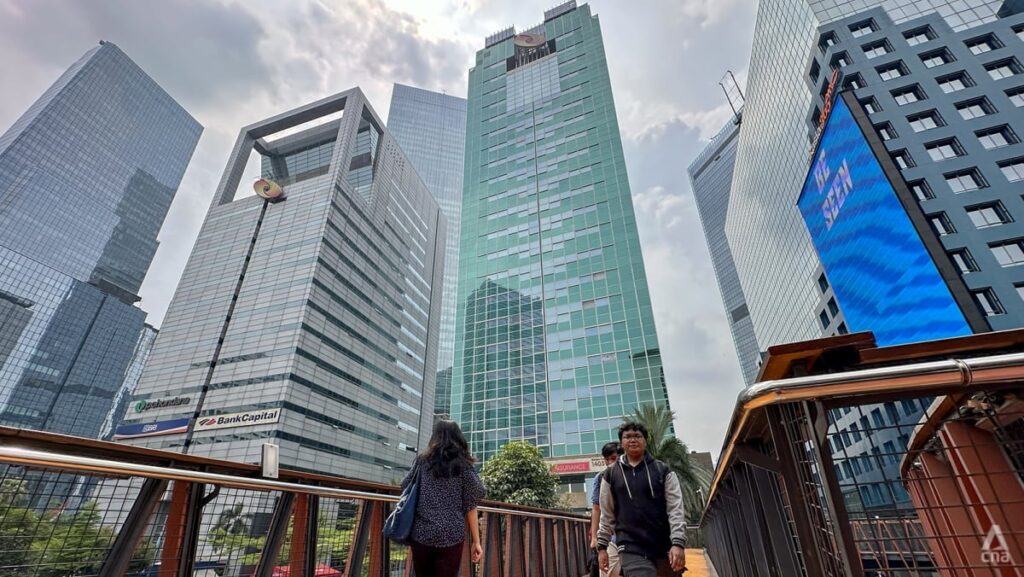When the Fed cut its interest rate three times in 2019, BI also did so, making four adjustments that year. When the Fed started to increase its rate in 2022, BI followed suit.
Mr David noted that the strength of the rupiah – which had surged on expectations of a rate cut in the US – had helped make BI’s own move possible.
THAILAND FACING ECONOMIC DILEMMAS
Over in Thailand’s capital Bangkok, every weekday morning, Ms Chonnikarn Chintanaroj is greeted by messages in her family’s WhatsApp group chat.
Without fail, it is her father, keeping everyone abreast of the fluctuations of the Thai baht, global oil prices and other key economic data.
The Fed’s recent actions have meant this information has become even more critical to business.
“It’s like, happy Monday! And then all the information, all the analysis of the trends for the day and for the rest of the week,” she said.
Ms Chonnikarn is the marketing director of her family’s long-running export business. With customers all over the world, they provide Thai products such as soy sauce, rice and noodles to be used in restaurants or sold in markets overseas.
With all of their transactions done in US dollars, the strength of the Thai baht in recent weeks – which reached its highest mark versus the US dollar since early 2022 – has dented the profitability of the business.
The support level of 32.20 baht per dollar was broken through last month, reaching 32.15 on Sep 30. This is a price point where a currency tends to stop falling and may begin to rise again.
“The Thai baht, it’s been getting stronger. To put it the easiest way, basically, we get less money,” she said.
If exporters lift their prices in response to the currency fluctuations, it can make their products less competitive compared to regional rivals, a dilemma also filtering through other parts of the Thai economy at present.
In reaction to the Fed, Commerce Minister Pichai Naripthaphan urged the BoT to consider a cut to rates, which are already among the lowest in the region at 2.5 per cent, to stimulate investments and ease pressures on regular Thais being buried by record levels of debt.
“Every time the US raises or cuts interest rates, it affects the flow of capital in and out of Thai markets. When the US’s policy rate goes down it would also cause the baht to strengthen, and vice versa,” he told local media last month.
Thailand’s recent currency scenario is not isolated – the Indonesian rupiah, Malaysian ringgit, Singapore dollar and Chinese yuan have all also strengthened in recent weeks, a small potential silver lining for Bangkok.
“Thailand’s export competitiveness is less affected, as a result of the collective strength of Asian currencies”, said Ms Erica Tay, an economist at Maybank Investment Banking Group, based in Singapore.
However, the kingdom is currently grappling with significant household debt, which stands at about 90 per cent of the country’s GDP – a 15-year high.
“This high level of debt is a significant impediment to economic growth, affecting consumers across different age groups,” said Ms Wilasinee.
It means people of all ages across Thai society are cutting back on discretionary buying and delaying major purchases, while credit card debt is a “key financial hurdle” for 23 per cent of Thais, according to Mintel analysis.
Waning consumer confidence in Thailand has been fuelled by the increased costs of regular household goods like food and drink, electricity and petrol.
Inflation has been lower than expected, however, at 0.35 per cent in August, below the BoT’s target range of 1 per cent to 3 per cent, a symptom of insufficient consumption or production.
Ms Tay said she expects the Bank of Thailand to make a 25 basis point cut only in the first half of 2025, meaning rates would stay in place for the remainder of this year.
There is speculation that a move could come earlier than that when the BoT meets next on Oct 16. The government has been keen for a drop to help ease some of the debt pressures on consumers and assist the financing of its digital wallet scheme, where it intends to give 10,000 baht cash handouts to millions of eligible residents.
But Ms Tay expects the central bank to remain cautious. “Over-borrowing by households, especially for non-investment purposes, has led to high levels of debt.
“Lowering interest rates might spur more borrowing and exacerbate the problem,” she said.
Read the full article here

